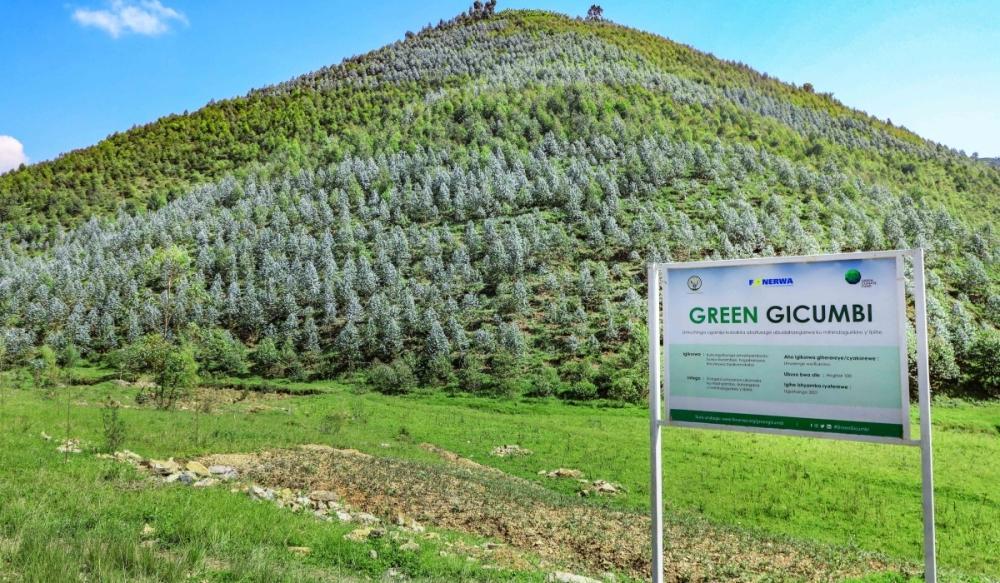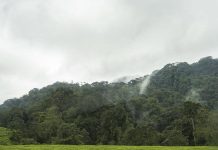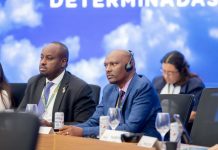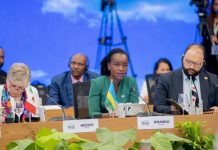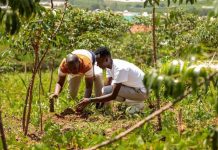Africa-Press – Rwanda. Rwanda is among the top five regional countries that are investing in carbon market projects, according to the State of Africa’s Environment Report released on September 18.
The State of Africa’s Environment Report, published by the Centre for Science and Environment, was presented during a conference of journalists from across Africa for the book release and media briefing in Addis Ababa, Ethiopia.
Carbon markets are trading systems in which carbon credits (one carbon credit representing one tonne of reduced or avoided emissions) are bought and sold to reduce air pollution.
Companies or individuals can use these markets to offset their greenhouse gas emissions by purchasing credits from entities or countries that reduce or remove emissions.
Some countries, like Rwanda, are mobilising climate finance by attracting companies and countries interested in buying carbon credits to offset their greenhouse gas emissions.
Carbon trade is among the eight topics in the report. These are extreme weather events, climate-induced migration, food security and climate change, water, disease burden, climate debt, carbon trade, and climate adaptation.
The spending on carbon market projects was described as “Top five country share of regional project capital expenditure”, whereby Rwanda has a share of 6 per cent, Ghana with 9 per cent, Malawi with 10 per cent, Nigeria with 10 per cent, and Kenya with 24 per cent, while the rest of the Sub-Saharan region has 41 per cent.
The report says that by 2024, Africa had about one-fifth of the carbon credit projects listed in top carbon market registries.
Between 2013 and 2023, about 14 per cent of the world’s total, or $5.9 billion, was invested in carbon projects in Sub-Saharan Africa.
Most of the carbon credit projects in Africa are concentrated in two main areas: forestry and land use, and community-based projects like improved cookstoves.
The report says Rwanda is among the top five countries that are putting the most money into carbon-related projects in Sub-Saharan Africa.
It says the largest share of investment in carbon credit projects in Africa went to Kenya, which received about $1 billion between 2013 and 2023, with 70 per cent of that amount coming after 2020. It mainly relies on the voluntary carbon market, where individuals, companies, or organisations choose to buy carbon credits to offset their emissions, even if they are not legally required to.
It is different from the compliance carbon market, which is created and regulated by governments or international agreements, where companies are legally required to reduce or offset emissions.
According to the report, there are 214 carbon credit projects listed in the voluntary carbon market in Rwanda.
Types of carbon credits issued to voluntary carbon market projects in Africa include those in reforestation and forest management, wetland restoration, improved cookstoves, clean water, energy efficiency, community boreholes, bio-digesters, hydropower, wind, solar energy, among others.
Until May 2025, 124 million carbon credits had been issued to 444 cookstove-based projects in Africa.
Rwanda registered 60 cookstove projects, registering 8,470,992 credits.
A look at Rwanda’s progress on carbon market
By late 2022, the country had issued over 2.25 million carbon credits.
Some are from Clean Development Mechanism (CDM)/certified emission reductions activities; others from voluntary carbon market projects, according to the Rwanda Climate Change Portal—a gateway to understanding how the country is tackling climate change and building a sustainable, carbon-neutral future.
At the UN 28th Conference on Climate Change (COP28) in Dubai, in 2023, Rwanda officially launched its National Carbon Market Framework.
This lays out rules for how carbon credits are to be generated, traded, and verified, with measures to ensure transparency and avoid double counting.
Rwanda has taken a significant step forward in its climate action plan, with 19 projects now ready to participate in the international carbon market as a way of mobilising climate finance, the Rwanda Environment Management Authority (REMA) announced in June 2025.
REMA’s Deputy Director General, Faustin Munyazikwiye, said these 19 projects are categorised mainly in three areas: 12 are focused on energy-efficient stoves, three on agroforestry and reforestation, and four on water purification.
Rwanda is exploring innovative approaches to mobilise $6.2 billion in climate finance, from 2024 to 2030, as part of implementing the newly adopted Climate and Nature Finance Strategy.
Article 6 of the Paris Agreement
Rwanda is working to be ready to participate under Article 6 of the Paris Agreement, which enables cooperative approaches/trading of emissions reductions between countries.
Article 6 of the Paris Agreement provides guidelines for international cooperation to achieve climate targets through carbon markets and non-market approaches.
Under Article 6.2, countries can enter into partnerships with other countries and transfer emission reductions, known as Internationally Transferred Mitigation Outcomes (ITMOs).
In this mechanism, one country pays for an emission reduction project in another country in exchange for emission reduction units or carbon offsets, which can then be used by the paying country to meet its own Nationally Determined Contributions (NDCs).
Article 6.4 establishes a centralised mechanism run by the UNFCCC to certify projects that issue emission reduction units which can be traded internationally.
Rwanda also has a partnership with the Global Green Growth Institute (GGGI) to assist with operationalising the framework, building capacity, stakeholder engagement, and making regulatory/procedural arrangements.
For More News And Analysis About Rwanda Follow Africa-Press

